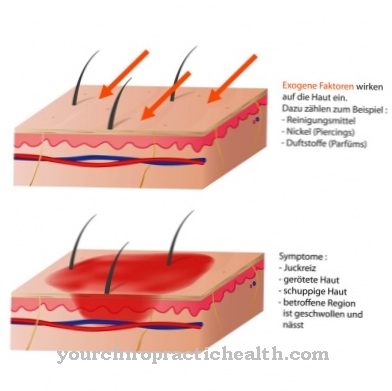Dry skin is not disease-worthy in itself. However, since it is extremely sensitive to various environmental influences, dry skin tends to be irritated. Those who suffer from it can do a lot themselves to properly care for dry skin.
What is dry skin?

Dry skin is glossy and often rough and rough. Redness, an uncomfortable feeling of tightness or itching often occur. Sometimes scales or small cracks form.
Dry skin does not produce enough natural oils. Due to the acute lack of fat, dry skin constantly loses moisture and is therefore insufficiently protected.
The side effects of dry skin are extremely uncomfortable. Because it's constantly itchy, dry skin is often scratched. The resulting wounds can lead to skin infections and also damage dry skin.
causes
Dry skin can have very different causes. First of all, the skin type is conditioned. In addition, the skin tends to become dry with age because the production of sebum decreases. This is why many elderly people suffer from dry skin.
General health and hormone levels also affect the skin. For example, taking birth control pills leads to dry skin in some women. Some medications also promote dry skin. These include preparations that have a dehydrating effect. Skin diseases such as neurodermatitis or psoriasis are also among the causes of dry skin. Allergy sufferers also often suffer from dry skin.
In addition to these internal factors, environmental influences and care mistakes are usually responsible for skin that is too dry. Air-conditioned rooms, strong temperature fluctuations, extensive sunbathing and frequent washing with skin-irritating cleaning agents promote the development of dry skin.
Diseases with this symptom
- Neurodermatitis
- eczema
- Leg Ulcer
- psoriasis
- allergy
- Celiac disease
- Malnutrition
- Ichtyosis vulgaris
- Diabetes mellitus
course
Dry skin does not produce enough natural oils. The horny layer of the skin normally stores water. Protective lipids on the surface of the skin prevent this water from evaporating. Frequent washing and other environmental influences attack this protective layer on the skin.
If the hydrolipid layer cannot regenerate, this leads to water being lost through the skin. As a result, the skin dries out.
Dry skin is sensitive to the effects of the weather and tends to develop redness, inflammation and broken veins. In addition, dry skin tends to wrinkle. In pronounced cases, dry skin takes on an appearance that is reminiscent of parchment.
Complications
Dry skin can have a variety of causes, which are accompanied by various complications. For example, atopic dermatitis causes an inadequate skin barrier, so that further pathogens can penetrate and infect the body, which worsens the symptoms. In addition to typical bacteria such as Staphylococcus aureus, fungi can also infect the skin.
In itself, neurodermatitis only causes itching and dry skin, but this can be a great psychological burden for the person concerned, so that he can develop depression which, in the worst case scenario, can result in suicide. Psoriasis takes a similar course to neurodermatitis. Both skin diseases can take a chronic course and worsen the psychological symptoms.
In general, dry skin can also result from increased excretion of fluids, as is the case with diabetes. The consequences of diabetes are numerous. The sugar that accumulates in the blood can gradually clog the small vessels, especially in the retina and kidneys, and thus lead to insufficient blood flow.
This can range from poor vision to blindness (diabetic retinopathy) in the eye, while progressive failure develops in the kidney (diabetic nephropathy). Nerve damage and injuries also lead to ulcers on the foot, which in the worst case leads to amputation.
When should you go to the doctor?
Of course, rough and dry skin is not always a clinical picture that must be treated by a doctor. Affected people who suffer from dry skin can, of course, take their own measures that contribute to the regeneration of the skin. Moisturizing creams or ointments can treat dry skin effectively and quickly.
However, if these agents are ineffective, a doctor should be consulted as soon as possible. Anyone who avoids visiting the doctor at this point is running a very high risk. Under certain circumstances, dry areas of the skin can cause so-called cracks. A crack is a small but deep crack in the skin that can no longer grow together independently. A visit to the dermatologist or family doctor is essential in such a case. Anyone who seeks medical treatment early with a deep crack in the skin has a very good chance of a full and rapid recovery.
The healing of a crack can be stimulated with appropriate medication. However, if you leave such a crack completely untreated, you run the risk of dangerous inflammation. Bacteria can nestle and multiply in such a skin crack. This can lead to severe inflammation that requires urgent treatment. Only in this way can serious consequential damage be avoided or treated accordingly.
Doctors & therapists in your area
Treatment & Therapy
Dry skin requires intensive care to compensate for the lack of oil and moisture. The most important measure to treat dry skin is to limit soap washes. Alkaline soaps remove fats from the skin, which it urgently needs for its own protection. When caring for dry skin, it is important to regenerate and maintain the protective film of the skin.
Cleaning with lukewarm water is often sufficient. Hot water is not good for dry skin. Only mild detergents should be used to clean the skin. Acid soaps, cleansing lotions with moisturizing substances or pure vegetable oil soaps are best.
But even gentle washing removes fat from the skin. That is why regular lipid regreasing is indicated for dry skin. Ointments and creams with a high percentage of vegetable lipids are best suited for this. Vegetable oils such as almond, avocado or olive oil also care for dry skin.
To relieve itching and soothe dry skin, care products with anti-inflammatory agents - such as chamomile extract or allantoin - can be used. Products containing urea or glycerine effectively balance the moisture balance of dry skin.
As home remedies, washing the face with buttermilk or sweet cream and taking capsules with wheat germ oil or cod liver oil are recommended. Drinking a glass of carrot juice daily is also said to work wonders for dry skin.
prevention
Home remedies ↵ for dry skin A healthy lifestyle is the best protection against dry skin. Sufficient sleep and a balanced diet are the best basis for healthy skin. The daily consumption of plenty of mineral water is also good for the skin.
Solariums, long stays in the blazing sun and extensive sunbathing are just as dangerous for the skin as smoking or excessive alcohol consumption. Walks in rainy weather and fog, on the other hand, are balm for dry skin.
You can do that yourself
Dry skin can be counteracted by certain factors. Too frequent showering or extensive bathing only dries out the skin unnecessarily. Therefore, you should not shower more than once a day. Those who like to bathe should not do so more than twice a week. The right temperature is also relevant. When showering, the water temperature should not exceed 36 degrees Celsius. A bathtub shouldn't be hotter than 39 degrees Celsius. If these temperatures are exceeded, additional fat is removed from the skin, which leads to dryness.
An oil can be added to the bath to give the skin fat and moisture at the same time. The use of suitable care products is also important. Soaps from the drugstore are usually very alkaline and do not correspond to the natural pH value of the skin. When buying shower gels, make sure that the pH value is matched to the skin.
After showering it is better to dry it off gently and not rub dry too hard, especially on irritated skin areas. Anyone who tends to have dry facial skin should avoid cleaning products that contain alcohol. Toner and scrubs should also be used sparingly. These can dry out the skin even further.
To prevent the skin from becoming too dry, it is advisable to take in sufficient fluids every day. Water and teas are particularly suitable for covering the fluid requirement. Especially in winter, the skin is very stressed by the dry heating air. Regular ventilation ensures good humidity. Furthermore, air humidifiers and green plants can ensure a better climate in rooms.













.jpg)

.jpg)
.jpg)











.jpg)